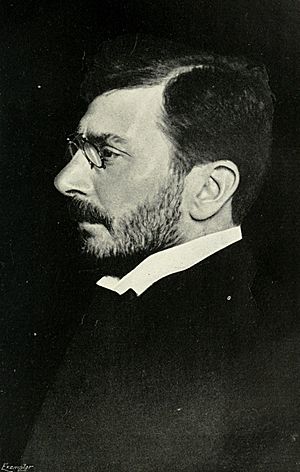Ferdinand Brunetière facts for kids
Quick facts for kids
Ferdinand Brunetière
|
|
|---|---|
 |
|
| Born | Ferdinand Vincent-de-Paul Marie Brunetière 19 July 1849 Toulon, France |
| Died | 9 December 1906 (aged 57) Paris |
| Occupation | Literary critic |
| Language | French |
| Nationality | French |
Ferdinand Brunetière (born July 19, 1849 – died December 9, 1906) was a famous French writer and a literary critic. This means he wrote about and judged other people's books and writings.
Contents
Life and Career of Ferdinand Brunetière
Early Life and Education
Ferdinand Brunetière was born in Toulon, a city in France. He went to school in Marseille and later studied in Paris at the Lycée Louis-le-Grand.
Ferdinand wanted to become a teacher. He tried to pass the exam for the École Normale Supérieure, a very good school, but he didn't succeed. Then, a war started in 1870, which stopped him from trying again.
Instead of teaching, he started giving private lessons. He also began writing about books and literature.
Becoming a Well-Known Critic
Ferdinand Brunetière started writing articles for a magazine called Revue Bleue. His articles were very popular. Because of this, he began working with another important magazine, the Revue des Deux Mondes.
He started as a writer for the magazine. Then he became a secretary and a sub-editor. By 1893, he became the main editor of the magazine. This was a big achievement for him.
Teaching and Recognition
In 1886, Brunetière was given a special job. He became a professor of French language and literature at the École Normale. This was a great honor because he hadn't gone through the usual academic path.
He also gave many important talks at the Sorbonne and other places. In 1887, he received the Legion of Honour, a top award in France. In 1893, he became a member of the Académie française, which is a very respected group of French writers and scholars.
His Writings and Ideas
Most of Brunetière's published works were collections of his articles and lectures. He wrote many books about French history and literature. Some of his well-known works include:
- Etudes critiques (1880–1898): These were critical studies on French history and literature.
- Le Roman naturaliste (1883): This book was about a style of writing called naturalism.
- L'Evolution de genres dans l'histoire de la littérature (1890): In this book, he used ideas from Darwinism (how things change over time) to classify different types of literature.
- He also wrote about the history of French lyrical poetry and a book about the famous writer Honoré de Balzac (1906).
Brunetière also wrote many articles and pamphlets about education, science, and religion. These often shared his strong opinions.
Political Views
Ferdinand Brunetière was involved in the Dreyfus affair. This was a big political scandal in France. Brunetière was a leading member of the group that was against Alfred Dreyfus.
Changes in Religious Beliefs
Before 1895, many people knew Brunetière as a rationalist. This means he believed that reason and science were the main ways to understand the world.
However, in 1895, he wrote an article called "Après une visite au Vatican." In this article, he said that science couldn't really teach people how to be good members of society. He believed that only faith could do that. Soon after, he became a Catholic.
As a Catholic, Brunetière followed the church's teachings closely. He also had conservative political views. He even wrote an article about a religious leader named Bousset for the Catholic Encyclopedia.
Works by Ferdinand Brunetière
- Études Critiques sur l’Histoire de la Littérature Française (8 volumes, 1880–1907).
- Le Roman Naturaliste (1883).
- Histoire et Littérature (3 volumes, 1884).
- Questions de Critique (1888).
- Nouvelles Questions de Critique (1890).
- Évolution de la Critique (1890).
- Évolution des Genres dans l’Histoire de la Littérature (2 volumes, 1890).
- Epoques du Théâtre Français (2 volumes, 1891–1892).
- Histoire de la Littérature Française Classique (4 volumes, 1891–1892).
- Essais sur la Littérature Contemporaine (1892).
- Évolution de la Poésie Lyrique en France au dix-neuvième Siècle (2 volumes, 1892–1894).
- La Science et la Religion (1895).
- Nouveaux Essais sur la Littérature Contemporaine (1895).
- Bases de la Croyance (1896).
- La Renaissance de l'Idéalisme (1896).
- Manuel de l’Histoire de la Littérature Française (1898).
- Discours Académiques (1901).
- Les Raisons Actuelles de Croire (1901).
- Victor Hugo (2 volumes, 1902).
- Variétés Littéraires (1904).
- Cinq Lettres sur Ernest Renan (1904).
- Sur les Chemins de la Croyance (1904).
- Honoré de Balzac, 1799–1850 (1906).
- Discours de Combat (3 volumes, 1900–1907).
- Lettres de Combat (published after his death, 1912).
Works Translated into English
- Essays in French Literature (1898, translated by D. Nichol Smith)
- Manual of the History of French Literature (1898).
- Honoré de Balzac (1906). A second edition came out in 1907.
- The Law of the Drama (1914).
- Science and Religion (2016, translated by Erik Butler).
See also
 In Spanish: Ferdinand Brunetière para niños
In Spanish: Ferdinand Brunetière para niños
 | Precious Adams |
 | Lauren Anderson |
 | Janet Collins |

